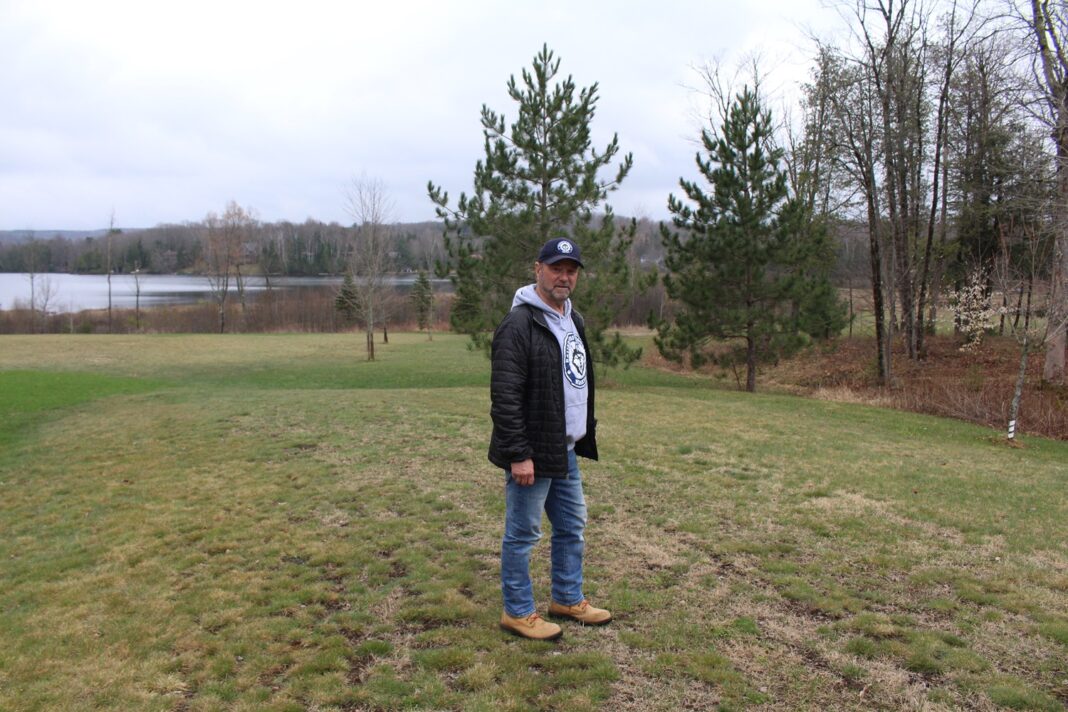The years-long battle between property developer Paul Wilson and members of the Friends of Grass Lake (FGL) over a proposed build off Peninsula Road in Haliburton has concluded. An agreement to reduce the number of residential units was ratified by the Ontario Land Tribunal (OLT) this week.
Wilson and FGL representatives appeared before the OLT Nov. 25, presenting terms of a settlement the two parties have been working on since the summer.
A three-week hearing was set to begin Monday. Originally, the project was to feature 88 units across four lots on the lake’s western shore. Each lot would have housed multi-storey apartment and condo buildings, with one unit – the one closest to Peninsula Road and County Road 21 – to feature a commercial component.
Speaking to The Highlander following the hearing, Wilson said the new agreement is to develop 38 units. The northernmost parcel will feature a 35-unit apartment-style building, with the capability for commercial use, while the other three lots have been redesigned for single-family homes.
“I’m happy this is over, and the project isn’t in limbo anymore,” Wilson said.
He said he decided to reduce the number of units after speaking with builders in the area who felt it would be difficult to make money with the original 88-unit design.
“The answer I got from them is that this just isn’t the time to do this [build]. Prices are too high for materials. They wouldn’t be able to make any money. They said even if I gave them the lot for nothing, they still wouldn’t make any money,” Wilson said.
Only one of the four proposed condominiums would have been large enough to be economically-viable, Wilson said. Already five years in, the property developer decided he didn’t want to wait. He said the next step is for Dysart et al township to process severance applications for the four lots, which he expects to happen in early spring. Wilson then plans to list the properties.
After initially agreeing to donate one of the four lots to non-profit Places for People, to create 15 new affordable rentals in the village, Wilson said he still plans to work with the organization.
“With the one lot now being for 35 units, that is beyond the financial scope for P4P to do this by themselves. I’m trying to work with them and other groups to collectively develop that property,” Wilson said. “They will be part of it – I made a commitment to help P4P and I want to honour that.”
Fay Martin, P4P vice president, said discussions have taken place between the local non-profit and Peterborough’s Habitat for Humanity branch, where she’s also a board member.
“The County is in Habitat’s catchment but it’s hard for them to do their thing up here without a solid base in the community,” Martin said, feeling there’s potential for a joint Habitat/P4P venture on the Grass Lake lands.
“Paul Wilson’s project is a marvellous opportunity for figuring out the complications of how best to structure that partnership,” Martin added.
“The discussions are underway… from several angles.
Affordable housing still likely
“I’m confident the wait will be worth it. We’re piloting a really exciting partnership model here and I will be delighted when the outside world looks at what we accomplish and say, as they did with the community bond raise, ‘wow, who’d have thought a little community like that could do something that creative?’” Martin said.
Wilson has also initiated a planting plan to re-naturalize currently cleared areas within the 30-metre buffer from Grass Lake and a man-made pond on the property. That work has already begun, said Wilson, who has hired Greenwerx Garden Design to lead the project.
It was also agreed that there will be no pedestrian path installed on Peninsula Road, no fence constructed at or near the high water mark, while Wilson will also contribute $5,000 towards water quality sampling and analysis on Grass Lake. He said there would be no further dredging or removal of native aquatic vegetation in the land below the high water mark.
There’s also an agreement with Haliburton Veterinary Services to address any potential effects the new development’s water supply may have on the business.
With Dysart and Haliburton County councils already signing off on official plan and zoning bylaw amendments, and the OLT hearing in the rearview mirror, Wilson said he can finally see light at the end of the tunnel.
“I want to get out of this… my objective is to wrap this up in the next three or four years,” he said.
Friends group reacts
Carolyn Langdon, Lynda Williams, Catherine Swift, and Don Ross have been behind the FGL movement since August 2021. In a release to the media this week, they said they were satisfied with the settlement.
“We are pleased that we have been able to reach this agreement with Harburn Holdings. This significant reduction in residential units, from 88 to [38], will help to preserve the wetland environment to a much greater degree than the original proposal would have allowed,” Ross said.
Swift said, going forward, the Friends group intends to “closely monitor” work in the area to ensure compliance with Dysart and County regulations and the settlement agreement.
They also plan to assess the water quality of Grass Lake over the next five years.
“Any development on this site will not be positive for Grass Lake, so it is important we establish a water quality testing regime… before, during and after development,” Swift said.
Langdon said she will continue to lobby for more native vegetation along the shoreline to further protect the lake. As far as Wilson is concerned, Monday’s settlement drew a line under the situation. “We negotiated in good faith – nobody gets everything they want in a settlement. I gave up 50 residential units, but I know some [FGL members] still aren’t happy… at the end of the day, you shake hands and we go on with life,” Wilson said.





